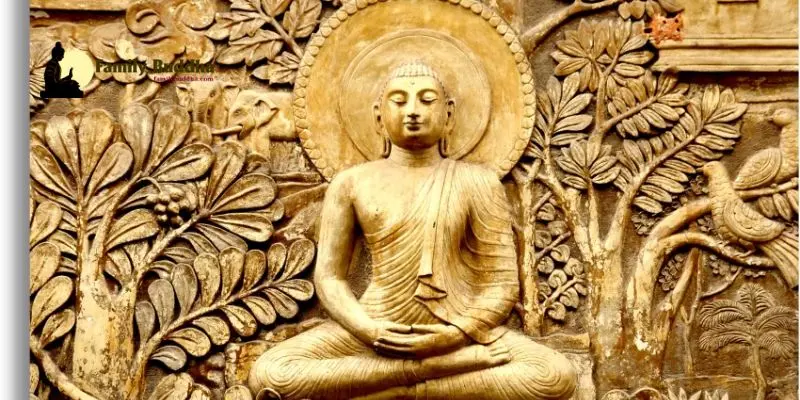Have you ever felt like the world is full of suffering, a sentiment the Vietnamese often describe as “Đời là bể khổ”? This feeling of existential angst, of recognizing the inherent suffering in existence, is a key theme that connects the philosophy of Arthur Schopenhauer, a 19th-century German thinker, and the ancient Eastern tradition of Buddhism. While separated by time, geography, and culture, the resonance between Schopenhauer’s ideas and Buddhist teachings is surprisingly profound, offering a unique lens through which to understand both.
Schopenhauer’s Philosophy: A World of Will and Representation
Before diving into the intersection of Schopenhauer And Buddhism, let’s understand the former’s core ideas. Schopenhauer, known for his pessimistic worldview, believed that the world is driven by a blind, insatiable force he termed “Will.” This Will, according to him, is not the rational will of humans but a universal, primal force underlying all existence, constantly striving for fulfillment yet forever generating suffering.
He argued that we perceive the world through “representations,” our senses and intellect filtering reality. This means we never truly experience the world directly but only our subjective interpretations of it.
Schopenhauer’s philosophy posits that:
- Life is suffering: He famously stated, “Life swings like a pendulum backward and forward between pain and boredom,” echoing the Buddhist concept of Dukkha.
- Desire fuels suffering: Our desires, driven by the Will, lead to a perpetual cycle of craving and dissatisfaction. Even when a desire is fulfilled, another arises, leaving us eternally wanting.
- Transcendence is possible: Schopenhauer, however, offered a glimmer of hope. He believed that through aesthetic contemplation, particularly of art and music, and through compassion, we can temporarily escape the tyranny of the Will.
Buddhism: The Path to Liberation from Suffering
Buddhism, originating in India with Siddhartha Gautama, the Buddha, also centers on the reality of suffering. However, unlike Schopenhauer’s somewhat bleak outlook, Buddhism offers a practical path to liberation from this suffering.
Here’s a glimpse into core Buddhist teachings:
- The Four Noble Truths:
- Life inherently involves suffering (Dukkha).
- Suffering arises from attachment and craving (Tanha).
- Suffering can cease (Nirodha).
- There’s a path to the cessation of suffering, the Noble Eightfold Path (Magga).
- The Noble Eightfold Path: This path provides guidelines for ethical conduct, mental discipline, and wisdom, ultimately leading to liberation from the cycle of suffering.
- Karma and Rebirth: Buddhism posits that our actions have consequences (karma) and that we are reborn into different realms of existence based on our karma.
 Books by Schopenhauer
Books by Schopenhauer
Parallels Between Schopenhauer And Buddhism: A Shared Existential Angst
Despite their distinct cultural and historical contexts, striking similarities emerge between Schopenhauer’s philosophy and Buddhist thought.
1. The Universality of Suffering:
Both Schopenhauer and Buddhism acknowledge suffering as an intrinsic part of existence. While Schopenhauer emphasizes the frustration inherent in the Will’s constant striving, Buddhism focuses on the suffering caused by attachment and craving. As the Vietnamese proverb says, “Tham thì thâm,” meaning “Greed leads to darkness,” highlighting the shared understanding of desire as a root cause of suffering.
2. The Illusion of Self:
Schopenhauer argued against the notion of a permanent, independent self, a view resonating with the Buddhist concept of “anatta” or “non-self.” Both philosophies suggest that our sense of self is an illusion, a construct woven from fleeting experiences and desires.
3. The Path to Liberation:
Both Schopenhauer and Buddhism offer paths to alleviate suffering. While Schopenhauer advocates for aesthetic experiences and compassion, Buddhism prescribes the Noble Eightfold Path, encompassing ethical conduct, mental discipline, and wisdom cultivation.
 Buddhist Monk in Meditation
Buddhist Monk in Meditation
4. Compassion as an Antidote:
Both emphasize the importance of compassion. Schopenhauer viewed compassion as a way to momentarily transcend the ego-driven Will, while Buddhism considers loving-kindness and compassion as integral components of the path to enlightenment.
Schopenhauer’s Influence on Western Interest in Buddhism
Schopenhauer is credited as one of the first Western philosophers to engage seriously with Eastern thought, particularly Buddhism. His writings played a crucial role in introducing Buddhist ideas to a Western audience, sparking interest and further exploration of Eastern philosophies.
Did Schopenhauer Convert to Buddhism?
While Schopenhauer was deeply influenced by Buddhist ideas, it’s important to note that he didn’t convert to Buddhism in a formal sense. His work reflects an assimilation of Buddhist concepts into his own philosophical framework rather than a complete adoption of Buddhist doctrine. He remained critical of certain aspects of religious dogma and emphasized the philosophical core of Buddhism that resonated with his own thinking.
Continuing Relevance: Schopenhauer, Buddhism, and the Modern World
The ideas of Schopenhauer and Buddhism hold a particular relevance in our modern world grappling with issues like consumerism, existential anxieties, and the search for meaning.
1. Mindfulness and Mental Well-being:
The Buddhist emphasis on mindfulness and meditation aligns with contemporary interest in mindfulness-based practices for stress reduction and mental well-being.
2. Ethical Consumption and Sustainability:
The Buddhist principle of non-attachment and Schopenhauer’s critique of desire resonate with concerns about excessive consumerism and its environmental impact, encouraging a more mindful and sustainable approach to living.
3. Finding Meaning in a Materialistic World:
Both Schopenhauer and Buddhism offer valuable perspectives on finding meaning and purpose beyond material pursuits, prompting introspection and the pursuit of a more fulfilling life.
 Schopenhauer and Buddha
Schopenhauer and Buddha
Conclusion: A Dialogue Across Cultures
The convergence of Schopenhauer’s philosophy and Buddhist thought provides a compelling example of how wisdom traditions from different parts of the world can offer complementary perspectives on the human condition. Their shared emphasis on the nature of suffering, the limitations of desire, and the potential for liberation continues to resonate with individuals seeking meaning and solace in an increasingly complex world. Their insights encourage introspection, ethical conduct, and a deeper understanding of ourselves and the world around us. Just like the Vietnamese saying, ” Đi một ngày đàng, học một sàng khôn” (Traveling a day brings a basket of wisdom), exploring the intersection of Schopenhauer and Buddhism offers valuable insights into navigating the complexities of life and the enduring quest for peace and fulfillment.









